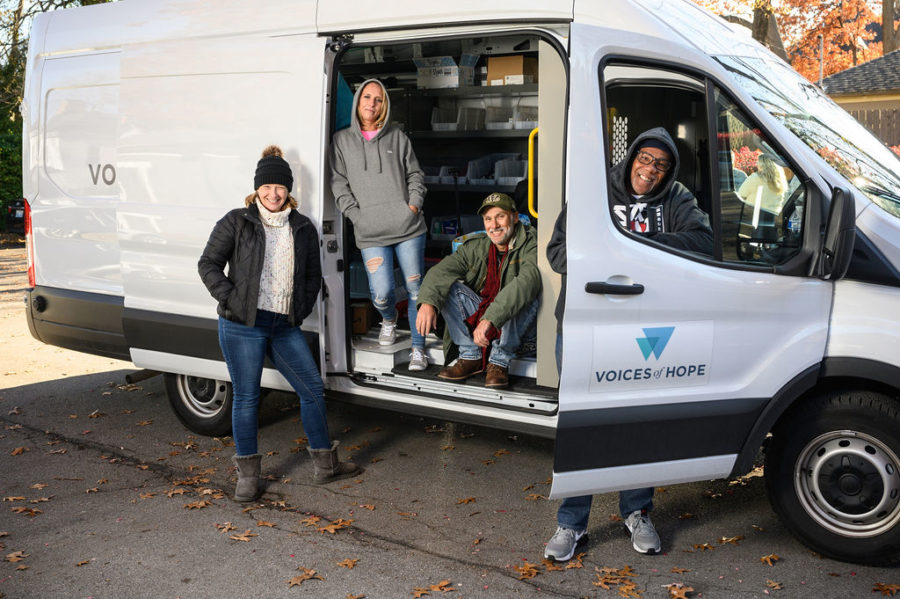Paving pathways to recovery at Voices of Hope
Voices of Hope team members stand in their mobile engagement unit. Photo provided by cofounder Alexander Elswick.
April 17, 2023
Alex Elswick got his wisdom teeth removed when he was 18.
Before he knew it, he was addicted to opioids.
“I was prescribed oxycodone and long story short, addiction took me all the bad places it takes people,” Elswick said.
Luckily, Elswick had access to resources and support to guide him through recovery. The same cannot be said for many people suffering from drug addiction.
That’s where Elswick got the idea for Voices of Hope, the non-profit recovery community center he opened in Lexington with his mother Shelly Elswick and fellow addiction recovery and awareness advocate Amanda Fallin-Bennett in 2016.
“I had access to lots of different forms of help, from not just different forms of treatment but also housing, education and employment,” Elswick said. “So Voices of Hope was really built on the back of that experience as a way to try to recreate it for people, to kind of level the playing field.”
Voices of Hope offers coaching services, phone check-ups, overdose response training, employment and housing resources for people in any addiction stage as well as support for friends and family.
Everyone employed by Voices of Hope is in recovery or has been impacted by addiction in some way, so they understand what participants are going through.
“We support all pathways to recovery,” Elswick said. “You decide what that looks like to you and what your goals are.”
Voices of Hope believes in a harm-reduction approach, meaning they strive to minimize harm of drug use in the lives of those suffering from addiction.
This includes helping people get connected with medications for opioid use disorder (MOUDs), changing people’s route of administration or type of drug to be less harmful and offering lifestyle and relationship advice to improve overall wellness and in turn reduce drug use.
This differs from traditional rehabilitation centers, which focus on an abstinence-based approach to recovery.
“What we focus on first is connecting with people (and) meeting needs,” Elswick said. “Then our recovery coaches use that lived experience to connect with people. There is a long list of ways that we can help you without demanding that you be abstinent.”
Jimmy Chadwell started off as a recovery coach for Voices of Hope in November 2020 after recovering from 10 years of active use.
“Once I got into recovery I realized that I really enjoyed recovery and volunteer service and I realized that I would like to work in recovery,” Chadwell said.
Since then, he has worked his way up to program manager for Voices of Hope, supervising a study overseeing eight Kentucky counties that works to reduce opioid overdose deaths by linking individuals to MOUDs.
“I’m just really grateful to have this opportunity,” Chadwell said. “You know, four or five years ago I couldn’t hardly get out of bed without having to use some kind of drug and I don’t have to do that anymore.”
Now, Elswick works at the University of Kentucky as an assistant extension professor for substance use prevention and recovery.
Voices of Hope often collaborates with UK and other organizations throughout Kentucky to spread awareness and destigmatize addiction.
With two locations in Lexington, Voices of Hope has grown from five employees to over 100, with no plans to stop any time soon.
Elswick said he strives to provide people suffering from addiction with his organization’s namesake: hope.
“What’s the one thing that you can pass on to everyone, every time you engage with them? It’s it’s hope,” Elswick said. “It’s the most important thing for our participants to have. Because if you don’t have hope, you really don’t have what you need.”
































































































































































